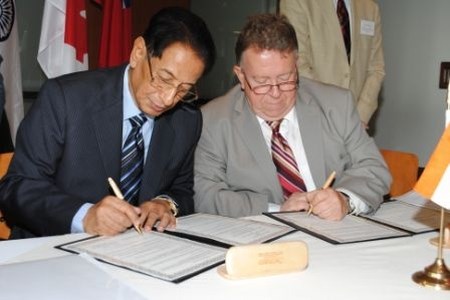India has renewed its interest in developing its mining and mineral sector.
Three visits from Indian government officials, the signing of a Memorandum of Understanding (MOU) with Ontario and a first-time provincial trade mission that took place in November were all strong indications that India is making the mining and mineral sector a strategic priority.
“First and foremost, the government of India recognizes that in order to sustain its economic growth, they have to foster their mining and mineral sectors,” said Indira Singh, executive director, Ontario Mineral Industry Cluster Council, Ministry of Northern Development, Mines and Forestry (MNDMF).
India produces 89 different minerals and has more than 3,000 operating mines, of which approximately one-third are privately owned.
Two-way trade between India and Canada in 2009 was worth $4 billion, and is forecast to increase to $15 billion in the next five years, stated Pierre Gignac, senior vice-president, Export Development Canada, in a July 2010 news report.
The annual growth rate of India’s mining industry is predicted to be 5.1 per cent until 2015.
In order to meet the needs of its growing middle class, India’s government has opened up its mining to direct foreign investment through the development of a new mineral policy, which will reduce government regulations and promote private sector involvement.
Singh said a cabinet committee is currently reviewing the policy before sending it to the Indian Parliament. The hope is that it will be passed by March 2011.
“There are some significant amendments to the mining act which promote sustainable development and the act will be more investor-friendly,” Singh said.
In the past, India permitted exploration but not mine development. Now, any junior miner can prospect, claim, explore and develop a mine. The signing of the MOU between the Ontario government and the Republic of India’s Ministry of Mines occurred on July 8, 2010. Although India’s mining industry is not developed like Canada’s, both countries stand to benefit from the accord.
“You cannot be profitable in a global economy if you only serve your home market,” Singh said. “Canada needs to have a future-growth-oriented strategy in emerging markets and India offers that.” India provides business and investment opportunities for Canadian mining suppliers, juniors and investors, as well as a potential market for human resources.
Global linkages can be established for research institutions like the Centre for Excellence in Mining Innovation (CEMI).
As much as 90 per cent of the world's diamonds end up in India, where two million people are employed in the diamond cutting and polishing industry. It offers expertise for Ontario’s emerging diamond market.
India will benefit from Ontario’s exploration and mining expertise and technology, and training in mining skills development.
“We have a number of institutions (in Ontario) that provide training,” Singh said. “We are looking at exchange programs, whether that (involves) students, professors or researchers with local educational institutions.”
A joint working group was established and met in September and November to work out logistics and identify areas that require capacity building. David O’Toole, recently appointed deputy minister of MNDMF, chairs the new committee.
He was also one of several Canadian delegates representing Ontario’s interests at India’s trade mission. The Indian trade mission to Kolkata occurred from November 9-13, encompassing two back-to-back events. This included the International Mining & Machinery Exhibition (IMME), a bi-annual event organized by the Confederation of Indian Industries in association with the Indian government’s Ministry of Mines of the Government of India; and the Global Mining Summit, organized by the Confederation of Indian Industry in co-operation with the Ministry of Mines.
The Ontario trade mission was sponsored by the Ontario Chamber of Commerce in partnership with MNDMF and the Ministry of Economic Development and Trade.
The sold-out event welcomed 360 exhibitors, of which 65 per cent were from outside of India. Approximately 15,000 visitors attended, many of whom represented major Indian buyers of equipment and services as well as those interested in collaborating with international companies.
Eight Canadian companies attended and participated in individual meetings with approximately eight to 10 companies each. Ontario hosted an invitation-only reception for bankers, pension fund managers and other Indian businesspeople interested in investment opportunities in Ontario.




